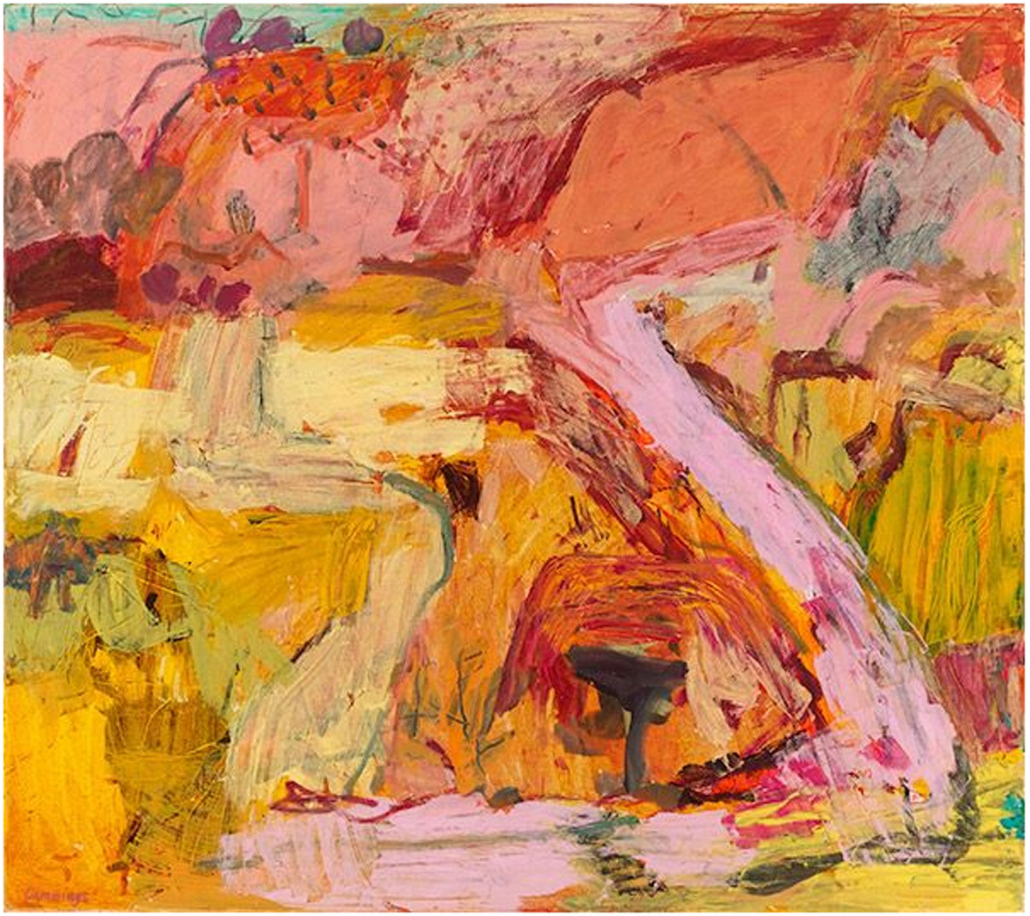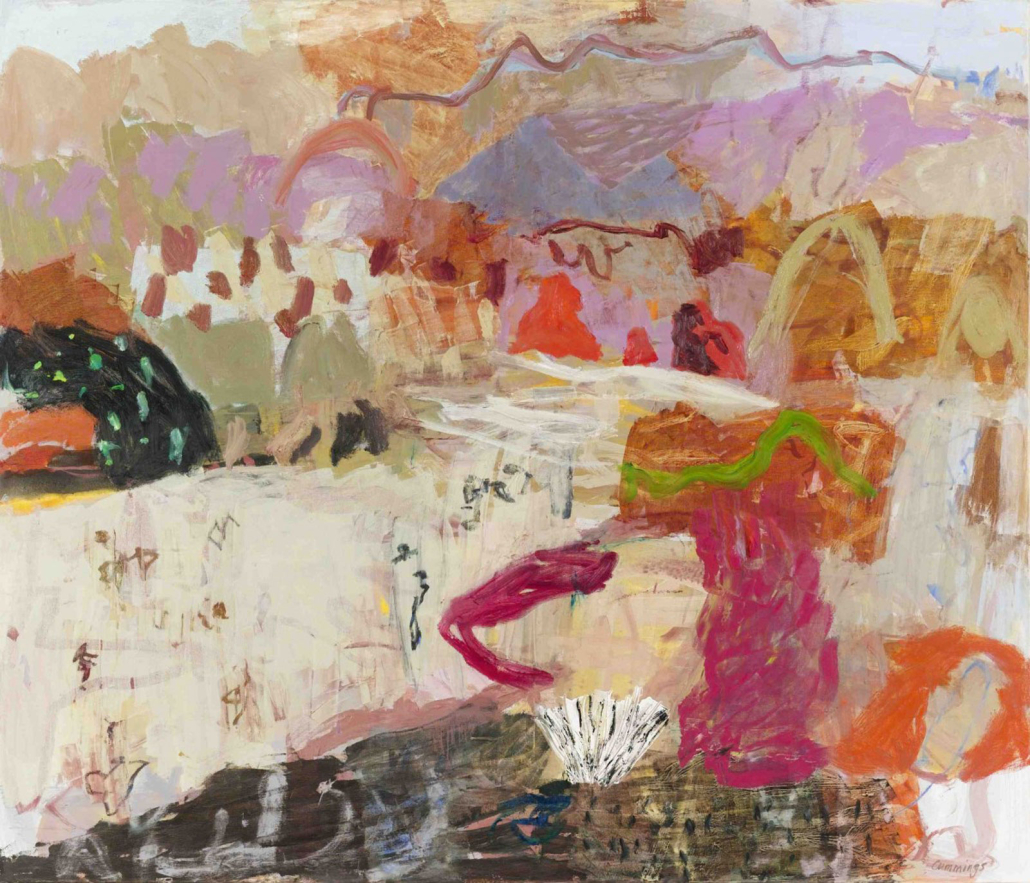Image: Elisabeth Cummings, ‘Mornington, Kimberley’, 2012.
Elisabeth Cummings lived in Europe for a decade, painting and, for a short time, studied under Oskar Kokoschka in Salzburg. On her return to Sydney, Australia, and through a generous donation of land from Barbara and Nick Romalis, Elisabeth Cummings – along with Roy Jackson and John Peart – established an artists’ community at Wedderburn in the early 1970s. Elisabeth continues to work from her studio there today.
Cummings’ bold use of colour and exaggerated mark-making is her signature approach to the Australian landscape. An intrepid traveller, Elisabeth continues her journeys around the Australian bush, painting smaller ‘en plein air’ works, as well as larger pieces back in the studio. She frequently returns to Wedderburn, where Elisabeth finds unending subject matter in the interior of her studio and in the surrounds she knows so well.
Elisabeth Cummings: “I start a painting en plein air by quickly getting first impressions and then the painting takes on its own life.”
‘Little decisions are the kind we can make’
Andrew Collis
Advent 3 (Gaudete Sunday), Year C
Zephaniah 3:14-18; Philippians 4:4-7; Luke 3:7-18
Rima, a mother of six, has been living in Jordan for 20 years after fleeing Gaza in 2004. Three of her children are disabled. Rima struggled with isolation and the burden of raising her family. But everything changed when she joined the Forsa project.
Act for Peace’s local partner in Jordan, the Department of Service to Palestinian Refugees (DSPR), runs the Forsa project – a two-year initiative that works with members of the Syrian and Palestinian refugee community.
It is a transformational program that not only helps refugees to meet their basic needs, like food and healthcare, but focuses on solutions through relevant training, and then eventually onto employment or small enterprises. This helps families like Rima’s to have a reliable source of income and hope for the future.
Rima has now started her own sewing business from home, which enables her to earn a stable source of income, while still being able to care for her children. She is also more confident thanks to the support she has received and feels a greater sense of community and belonging.
“I found motivation in the Forsa project. They took me from a negative situation to a positive one. If I need anything, I ask for their help, and they help me …” God be with you …
The Forsa project, in light of Paul’s exhortation to fundamental rejoicing, in light of John’s witness, calls to mind a song by Paul Kelly called “Little Decisions” (1985):
“Hard times are never over/ Trouble always comes … Little decisions are the kind I can make/ Big resolutions are so easy to break …”
In the face of disaster and often overwhelming needs, little decisions for life – little decisions in the name of justice and mercy.
The prophet Zephaniah calls God’s people to repentance; realignment to God’s ways – to good relationship.
John is a striking figure. Our text from Luke 3 sees him animated and angry, proclaiming disaster, threatening judgement, before responding in an altogether different tone to would-be followers who ask: “What should we do?”
John does not issue Herculean challenges. He simply directs the energies and generosity of questioners toward routine circumstances and opportunities. Little decisions for life – little decisions/actions in the name of justice and mercy.
Share your clothes and food. Deal honestly with others. Don’t bully anyone. Don’t accuse anyone falsely …
If John’s message were contemporised, we might hear him telling us: express the sincerity of your faith by a renewal of your love and devotion to one another … break the bread and share the wine … keep it simple … do what you’ve been called to do, as well as you can do it …
Journalists: report and investigate in the interests of the community – fairly, consistently.
Artists: keep working, keep going, share your visions of a world made beautiful and destined for glory – resist glib affirmations, and cynicism.
Little decisions mean incremental and ongoing conversion. Joining with others for praise and lament, confession and thanksgiving. Supporting the work of good people and good projects. Sharing resources, time and space.
“Hard times are never over/ Trouble always comes … Little decisions are the kind we can make/ Big resolutions are so easy to break …”
Sometimes we feel the truth of the gospel. Mostly, I suspect, we recommit ourselves (giving, donating) to joyful habits of mind, heart and hand, to joyful rituals and practices, to one another in the joy of community.
Over time, by virtue of incremental/sacramental troth-giving, we are truly changed. May it be so. Amen.
Christmas Bowl donations can be made via donation envelopes in the church or via our SSUC link: mycb.link/46613/.
 Image: Elisabeth Cummings, ‘From the two tanks, Fowler’s Gap’, 2012.
Image: Elisabeth Cummings, ‘From the two tanks, Fowler’s Gap’, 2012.




